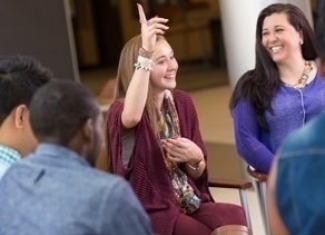July 2014
Leading Change
Small Groups, Big Impact
What difference can one person make?
At Iona-Hope Episcopal Church in Fort Meyers, Florida, we know that each of us can make a difference. We’re living proof that when we, as individuals, gather into small groups, and our small groups join with other small groups, we can bring about real change. Let me share our story…
Founded in 1998 as a mission church in the Diocese of Southwest Florida, Iona-Hope has at its heart a set of core values. Set and approved by the guiding team that helped establish the congregation, they have been affirmed and modified over the years. Our core values: All are welcome; openness to risk; change and growth; Jesus is model; a strong, real, personal relationship with Jesus; disciples making disciples; and mission doing mission have served us well and have been constantly taught over the years.
One of the ways we live into our core values is through collaborative leadership practiced through the use of small groups. From the beginning, we set up small groups to manage the usual necessities of a congregation (altar guild, hospitality, office angels), in answer to needs as they arise (adult living facility services, soup kitchen, technology team), and in response to a good idea (book club, memoirs for healing, shawl ministry).
Our policy has always been if you have an idea we will help find a place for that idea to be fulfilled. Whenever someone has an idea for ministry all that is required is that they help identify a leader, complete a brief statement of purpose, and agree to follow the covenant established for small groups. Each vestry member is assigned a small number of groups to stay in touch with and to report on needs and activities at vestry meetings. Group leaders meet monthly with the rector.
All of our groups operate on the same principles. Each small group has a lay pastor, a lay pastor apprentice, and a host as well as a statement of purpose and written agreements between the rector and each of the positions listed above. Each group also has a set of guidelines. Leadership positions are limited to three-year terms to prevent burn out and to make certain there are always positions for newcomers to move into leadership roles.
Working for Justice
Three years ago Iona-Hope launched our Justice Ministry small group, affiliated with the Lee (County) Interfaith for Empowerment or LIFE group. Each August, the Iona-Hope Justice Ministry group organizes house meetings for members of our congregation. Up to 10 people gather to discuss questions such as “What wakes you up at night” or “What is happening in our local community that aggravates you the most?” Responses are noted and a summary from all the groups is prepared. What has been amazing is how similar the answers are.
Following the house meetings, the leaders of our justice group participate in LIFE’s ingathering meeting where representatives from participating congregations share the findings from the many house meetings. Eventually, the many issues are narrowed into two or three. Again, it is amazing how similar the responses are and how well this process works.
Late in the fall the entire group of represented congregations meet and select a general issue to focus on. This past year, the chosen issue was the large number of juvenile arrests for seemingly minor offenses and the negative effect these arrests had on a person’s record. A research to action group was formed, tasked with researching the issue to further assess the problem and beginning to seek solutions.
In the spring the research is narrowed to a final issue and the groups begin to meet with local officials who have the authority to address the problem. The issue we finally settled on was the lack of the use of what are known as Civil Citations pursuant to Florida Statutes. Briefly stated county sheriffs and police chiefs have the option of issuing a Civil Citation instead of booking a minor on a misdemeanor and processing the individual through the court system. The Civil Citation program avoids an arrest record, the rate of recidivism is drastically reduced, the cost of processing is substantially reduced, and the minor does not have a record that can negatively affect their ability to qualify for scholarships, attend college, or get a job.
Following Nehemiah
The individuals who can have the most influence on the program are then asked to meet with us at our Nehemiah Action in the spring. The Nehemiah Action is our largest gathering and we try to get the largest possible number of people to these gatherings. Iona-Hope had 161 people in attendance, with the total attendance around 1200 people. The public officials (sheriff, chiefs of police, chief judge, states attorney) are then asked if they will do all they can to support the use of Civil Citations and to meet with representatives of LIFE on a regular basis to ensure that there is follow through in their promises.
The officials who attended our Nehemiah Action promised to do all that they could to increase the use of civil citations. Within a few weeks the county sheriff changed the policy of his office to require that the arresting officer issue civil citations or that a written explanation be given if a citation was not issued.
This action was a resounding success and a win-win all the way around! At the same time the people of our congregation who had previously felt as if there was nothing they could do to change public policy were affirmed in every respect. They had found their power. In fact they are basking in the glory of these positive results and chomping at the bit to get started on the next issue. There is also a very definite side benefit to all of our small groups because people can readily see how their efforts can be truly rewarded.
The Benefit of Small Groups
At Iona-Hope, we’ve recognized that change often takes place when you start out small. Someone has an idea: They share it with others. A leader is identified. A small group forms. The group acts on the idea, shaping and forming it. And when the time comes, the group decides to continue, perhaps with new members and new leaders, or to disband.
Utilizing small groups and teams is a great way of providing organization for our congregations, especially our smaller congregations that do not have a full-time priest assigned. They provide an opportunity – and framework – for helping people with ideas to get them off the ground. It teaches the effort and direction necessary for recruitment of teams and team members. Our practice of having both lay pastors and apprentice lay pastors for each team – as well as term limits - provides opportunities for training the next generation of congregational leaders.
Try This
What might it look life if your congregation adopted Iona-Hope’s small group model as a way to invite and involve people into the life of the congregation and its work in the wider community? To see how they organize – and advertise – their small groups, visit the small group page on Iona-Hope’s website.
Talk about this at an upcoming vestry meeting. Introduce the leaders of your various groups and ministries to the idea. Are there a few people interested in starting a small group to try and get this started in your congregation?
John Adler is a recently retired Episcopal priest who planted both the Iona-Hope Episcopal Church in Fort Myers, FL and Saint Monica’s Episcopal Church in Naples, FL. He’s getting used to retirement while seeking to rejuvenate a consulting relationship with dioceses interested in planting congregations that will grow into parish status, welcoming methodology, and promoting regular check ups by visiting clergy.
Resources
- Iona-Hope Episcopal Church Core Values
- Iona-Hope Episcopal Church Small Groups
- Learn more about how small groups function by reading these Iona-Hope newsletters July 2014 (see page 10 for a report from the Search and Call Team) and August 2014 (especially page 10 for the Book Club Team and page 11 for the Booth Team)
- Sample Small Group Covenant






